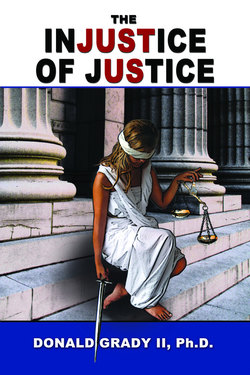Читать книгу The Injustice of Justice - Donald Grady II - Страница 4
На сайте Литреса книга снята с продажи.
Preface
ОглавлениеGeorge Bernard Shaw once said, “The reasonable man adapts himself to the world; the unreasonable one persists in trying to adapt the world to himself. Therefore, all progress depends on the unreasonable man.”
Injustice is an affliction of the reasonable. Most of us would admit our criminal justice system doesn’t work exactly the way we want it to or think it should. However, we’re willing to tolerate the system’s shortcomings because it’s comfortable and familiar.
Our current system is based on an old system whose modifications have been driven predominantly by fear. American prisons are full of non-violent people who pose no significant threat to the rest of us, but we lock them away as if they do. After all, it’s entirely “reasonable” to “get the bastards off the streets,” and it’s a whole lot easier than some of the alternatives. So do we continue to warehouse non-violent, less-serious offenders with the dangerous and insidious, or do we alter our position to ensure they learn how to act and interact more appropriately so they become useful, productive members of our communities? Our safety cannot be secured through repression and incarceration, but only through the efforts of ordinary citizens with hearts of heroes. It takes an aggregate of committed people with tremendous faith, love, and wisdom. It takes people willing to accept the errant and disenfranchised, and provide them with the guidance and opportunity to make a difference in their own lives and the lives of others. It takes people who are willing to give… forgive… and be forgiven.
This story is told from the perspective of a middle-aged businessman named Alan Pearson. Alan is a somewhat idealistic baby boomer whose life is centered around his family, his business, and a tight circle of friends. He hasn’t for a moment considered how completely his existence is enmeshed with the lives of those he cares about, let alone how he matters to the rest of humanity. But that’s about to change.
Alan finds himself unexpectedly caught up in the criminal justice arena and begins a quest for knowledge that, for him, turns into a drama of unimaginable consequence. He attends a presentation to better acquaint himself with the police and law enforcement. That experience starts him on a life-altering journey that changes him forever. Alan comes face to face with the American criminal justice system and the realities of contemporary policing in America.
He finds a mentor who guides him through the criminal justice labyrinth. He’s exposed to some common—but not so widely known—police practices, criminal justice ideologies, the courts, corrections and an enlightening, albeit brief, glimpse of aftercare. Alan’s experiences give him a whole new perspective regarding justice in America.
Through Alan, I’ve attempted to provoke you into thinking about important quality-of-life issues that affect you, your family, and your community. I believe every paradigm of justice should be based on building and maintaining socially healthy environments. It’s from that premise and from my perspective as a police executive that this work addresses the importance of matching police initiatives and criminal justice practices with increased social responsibility. I also allude to the part each person plays in relationship to the whole. To that end, I introduce you to the “Integrated” approach to community policing.
I developed Integrated Policing as a situational or contingency model using a natural open-system design. Integrated Policing is more than a philosophy. It’s a prescription for dealing with a community’s issues of crime and social disorder. Many of the concerns you and your family have about crime, community involvement, and police accountability are addressed in these pages.
While this story was created using imaginary characters in a fictitious setting, much of it is based on real-life issues and circumstances. The characters are not intended to portray actual people or groups, nor are the anecdotal accounts intended to identify particular organizations. The stories actually happened. Some are embellished; some are not. I intend for this document to generate thought. I want you to consider new possibilities for the future of policing and the American criminal justice system. Additionally, I want you to be safe and I want you to discover new and better ways to keep you and your family safe while creating more tranquil and humane communities.
